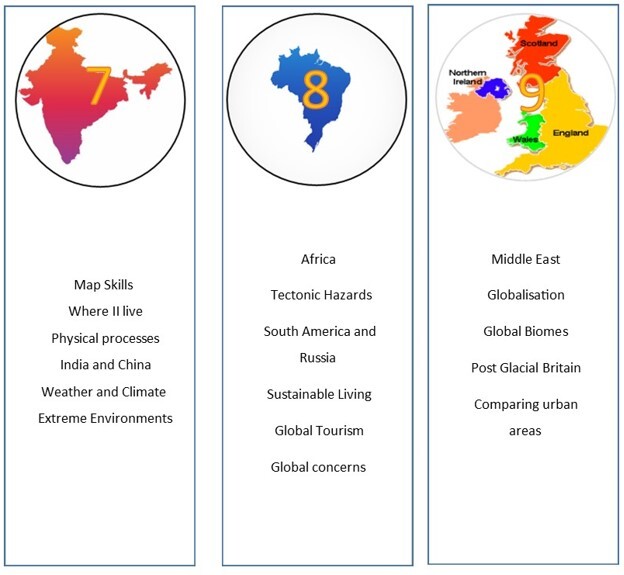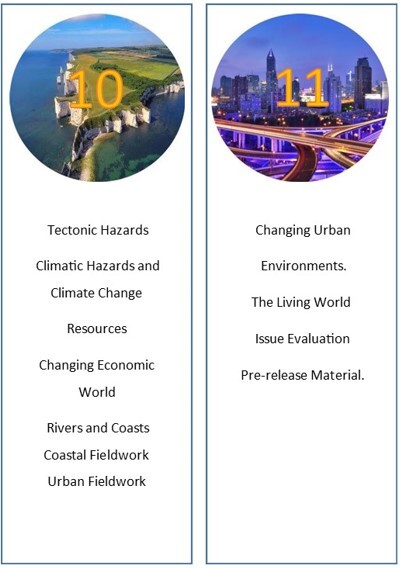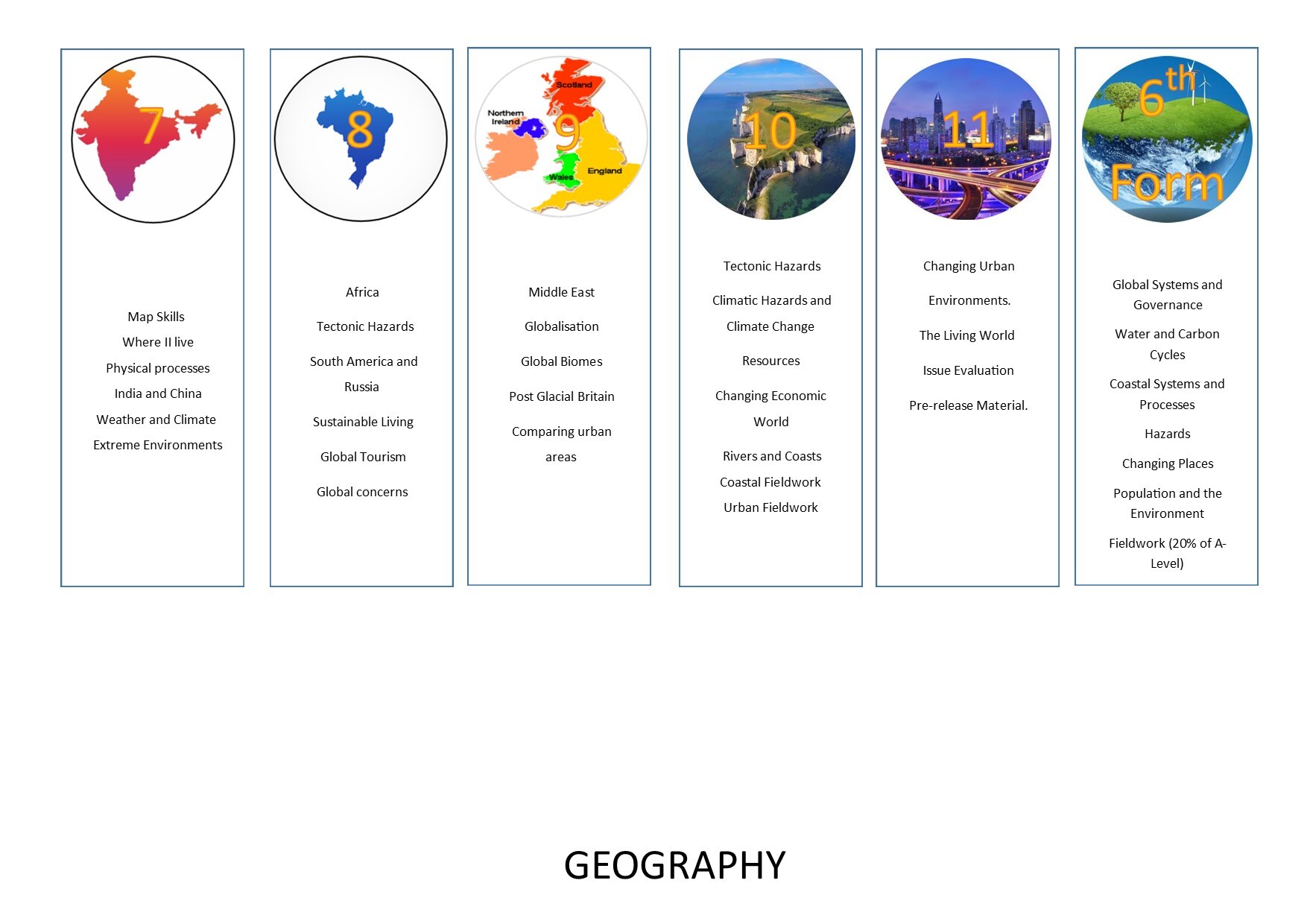- Home
- Secondary
- Subject Information
Geography
Back
Introduction
We live in an ever changing world full of excitement and wonder. Geography is all around us and influences our daily lives in more ways than what we appreciate. Fundamentally, the subject can be seen as comprised in two halves with knowledge on one side, skills on the other. Understanding Geography helps us understand the world we live in and the impacts that we have through every action we take. It is not just learning about how fossils fuels poison our atmosphere or how litter will negatively impact ecosystems, it helps us realise that we can also solve those issues.
Our subject area seeks to develop the following in all our students:
- Encourage a curiosity in all matters and to see beyond what is just in front of us
- Develop spatial awareness skills and further reinforce literacy and numeracy
- Interpretation and evaluative ability to fully show their understanding
KS3
Our ethos for our younger students is to Enjoy, Engage and Excel. We have developed a curriculum that touches on all of the main elements of geography such as the physical world in terms of rivers and ecosystems but also our human world in the form of global development and population change.
During key stage 3, students are expected to complete homework 30 minutes a fortnight unless otherwise directed. This could be as part of a larger ongoing project, worksheets, directed reading or any other task that is deemed appropriate.
As a department, we inspire students to take their learning beyond the classroom by suggesting interesting topics for students to look at that are currently in the news or linked to our current topics in the classroom. We encourage parents to support their child’s learning through having discussions with them about the world they live in and to discuss current news with them so that they can better understand the global issues that humans are facing.
KS3 Curriculum
 Assessments
Assessments
Students will be assessed regularly through assessed tasks in lessons whether that is written as part of longer answer questions, through the construction and interpretations of graphs and charts or through map work.
Students should in addition expect an end of topic exam per module which is often at the end of every half term. This in combination with in class assessed work, their general classwork and homework will factor into their current and predicted expected grades. It is therefore important that all students attempt all work and complete it to the best of their ability.
Homework
All students will be set homework to consolidate their learning in class or to broaden their knowledge of the topics currently being studied. For Year 7 and 8 who will have one lesson a week, homework will be set once a month and the estimated completion time will be half an hour. Year 9 who will have two lessons a week will have their homework set on a fortnightly basis again for half an hour. As home learning helps students revisit and refresh their learning, we appreciate your support in ensuring that this work is completed in a timely manner and to a good standard.
Learning websites
- https://www.ourplanet.com/en/schools-and-youth/ https://www.ourplanet.com/en/schools-and-youth/
- https://www.ordnancesurvey.co.uk/mapzone/
- https://getoutside.ordnancesurvey.co.uk/guides/map-reading-skills-for-children/
- https://www.geographyinthenews.org.uk/
- https://www.natgeokids.com/uk/
- https://www.nationalgeographic.com/
- https://www.bbc.co.uk/bitesize/subjects/zrw76sg
- https://www.bbc.co.uk/newsround
- https://www.independent.co.uk/topic/Geography
KS4
Geography is an important and challenging subject that has wide ranging real world applications. An excellent Geography student will have a wide interest in every aspect of the world around them. The AQA specification is challenging, engaging and topic relevant – it is a qualification that enables students to explore the issues the world faces and shows an individual’s place in it.
Geography as a subject is dependent upon the real world and as such, instead of the coursework of the past, students will undertake fieldwork to two contrasting areas which they will later be assessed as part of Paper 3. By the end of the course students should be skilled in interpreting data about global issues and society around them. Students with particular strengths in Maths and Science will excel in the mathematical and graphical components.
Key Stage 4 Curriculum

For key stage 4, our GCSE specification is AQA 9-1 (8035) We study the following topics:
- Coastal Landscapes in the UK
- Understand what processes shape Britain’s coastline
- How has the land use of coastal areas effected the sea defences
- Investigating how the coastline has been managed in an area of rapid erosion
- River Landscapes in the UK
- Understand how rivers shape the upland areas of the UK
- Investigate how the landforms found along a river are created
- Understand what the social and economic effects of flooding are
- The Living World
- Understand what physical factors affect the distribution of ecosystems around the world
- Investigate how the physical environment influences the plant, animals and human activity in the area
- Understand how these environments provide opportunities and challenges
- The Challenge of Natural Hazards
- Understand how the Earth is structured and what processes occur that will lead to plate tectonics
- Investigate what would be the impact of a hazard on a LIC and a HIC
- Understand what can be done to minimise the impact of hazards
- Walton on the Naze and Stratford Geographical Applications
- Understand how to collect a variety of data
- Understand what makes a good fieldwork investigation
- Urban Issues and Challenges
- Investigate the differences in the urban environment of NEEs and HICs
- Understand how land can be repurposed and regenerated
- Understand how favelas are changing due to international events
- Changing Economic World
- Investigate what factors enable development
- Understand why countries are at different levels of development
- Investigate what impacts TNC’s have on their host countries both positively and negatively
- The Challenge of Resource Management
- Investigate the issues surrounding water usage, food supply and energy production around the world
- Understand the concept and the application of sustainability
- Understand what are the causes of these issues and the appropriate solutions.
The GCSE is made up of three written papers as this specification has no coursework element:-
Paper 1:
- Written exam: 1 hour 30 minutes
- 88 marks (including 3 marks for spelling, punctuation, grammar and specialist terminology (SPaG))
- 35% of GCSE
Paper 2:
- Written exam: 1 hour 30 minutes
- 88 marks (including 3 marks for SPaG)
- 35% of GCSE
Paper 3:
- Written exam: 1 hour 15 minutes
- 76 marks (including 6 marks for SPaG)
- 30% of GCSE
- Pre-release resources booklet made available 12 weeks before Paper 3 exam
Students are expected to carry out between thirty minutes to an hours worth of homework per week which can be directed by the teacher or through further revision of their class notes to aid knowledge retention in preparation for examinations.
Visual Curriculum Map

Careers
Revision guides
As with any subject, there are a range of revision guides available to purchase. We recommend the following in terms of course content and ease of reading:
- My Revision Notes: AQA GCSE (9–1) Geography https://www.hoddereducation.co.uk/subjects/geography/products/14-16/my-revision-notes-aqa-gcse-(9%E2%80%931)-geography
- AQA GCSE (9–1) Geography Workbook https://www.hoddereducation.co.uk/subjects/geography/products/14-16/aqa-gcse-(9%E2%80%931)-geography-workbook
- GCSE 9-1 Geography AQA Revision Guide (with Online Ed) - New Edition for 2020 exams & beyond https://www.cgpbooks.co.uk/secondary-books/gcse/humanities/geography/gar45-new-gcse-9-1-geography-aqa-revision-guide
Useful links
- BBC Bitesize (KS3 Geography), accessed at: https://www.bbc.co.uk/bitesize/subjects/zrw76sg
- BBC Bitesize (KS4 Geography), accessed at: https://www.bbc.co.uk/bitesize/examspecs/zy3ptyc
- National Geographic for Kids, accessed at: https://www.natgeokids.com/uk/
- Royal Geographical Society (RGS), accessed at: https://www.rgs.org


